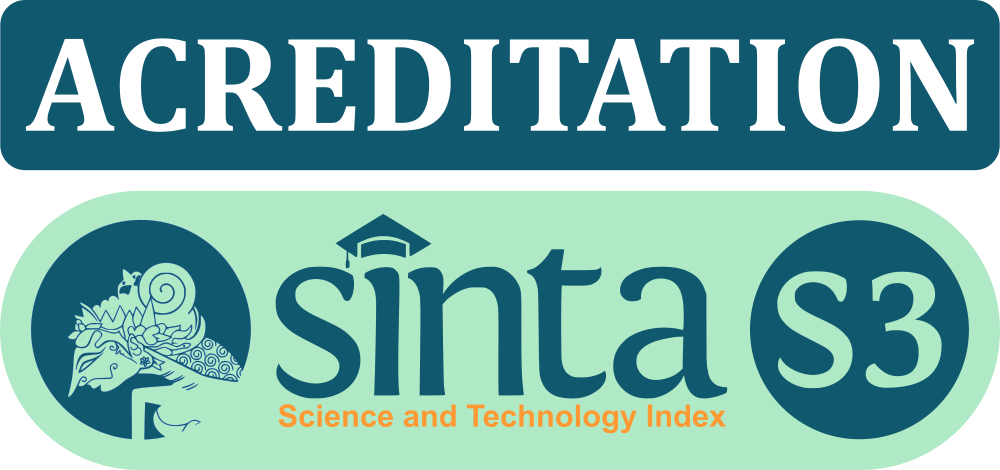Spindle Thermal Evaluation Thermal on Realiability Test of Numerical Controlled Lathe
DOI:
https://doi.org/10.29122/mipi.v13i2.3150Abstract
In the process of designing and manufacturing of CNC machine tools, reliability testing is needed to determine the reliability of the main component design and sub assembly. The precision of machine tools is greatly influenced by the temperature generated when the machine tool operates, both which arise from friction and overload.
Evaluation of spindle axis errors caused by thermal distortion of the spindle bearing is based on ISO 230-3: 2007, ISO 10791-10: 2001 and ISO 13041-8: 2004. Temperature measurement at several measuring points on the spindle head to determine the increase in temperature on the main spindle bearing when getting more load or cutting process.
The evaluation results showed that spindle erroneous error with a temperature increase in the spindle head was 16.3 oC by 13 um with no loading, while with loading 71.9 um with a temperature increase of 18.0 oC.
References
Li H, Yang Z, Xu B, Chen C, Kan Y, Liu G, Realibility Evaluation of NC Machine Tools Considering Working Conditons, Mathematical Problems in Engineering, 2016.
Mayr J, Jedzejewski J, Uhlmann E, Donmez M.A, Knapp W, Hartig F, Wendt K, Moriwaki T, Shore P, Schmitt R, Brecher C, Wurz T, Wegener K, Thermal Issues in Machine Tools, CIRP Annals – Manufacturing Technology, 2012.
Kim B.S, Bac G.T, Kim G.N, Moon H.M, Noh J.P, Huh S.C, A Study on the Thermal Characteristics of the Grinding Machine Applied Hydrostatic Bearing,Transctions of the Canadian Society for Mechanical Engineering, 2015.
Tlusty J, Manufacturing Process and Equipment, Prentice Hall, New Jersey, 2000.
Mori M, Mizuguchi H, Fujishima M, Mingkai N, Konishi K, Design Optimization and Development of CNC Lathe Headstock to Minimize Thermal Deformation, CIRP Annals – Manufacturing Technology, 2009.
Qianjian G, huo F, Refeng X, Xiang C, Guoyong Z, Jianguo Y, Spindle Thermal Error Optimization of a Five-Axis Machine Tools, Chinese Journal of Mechanical Engineering, 2017.
Wang H, Wang L, Li T, Han J, Thermal Sensor Selection for the Thermal Error Modeling of Machine Tools Based on the Fuzzy Clustering Methode, Journal Advanced Manufacturing Technology, 2013.
Feng J, Tang X, Li Y, Song B, Thermal Error Modeling of the Spindle Using Neurofuzzy System, Mathematical Problems in Engineering, 2016.
Zhang C, Gao F, Meng Z, Zhao B, Li Y, A Novel Linear Virtual Temperatur Construcing Methode for Thermal Error Modelng of Machine Tools, International Journal Advanced Manufacturing Technology, 2015.
Li Y, Zhao W, Wu W, Lu B, Chen Y, Thermal Error Modeling of the Spindle Based on Multiple Variable for the Precision Machine Tool, Journal Advanced Manufacturing Technology, 2014.
Dong Y, Zhou Z, Liu M, A General Thermal model of Machine tools Spindle, Advances in Mechanical Engineering, 2017.
Wu C.W, Tang C.H, Chang C.F, Shiao Y.S, Thermal Error Compensation Methode for Machine Center, Journal Advanced Manufacturing Technology,2012.
Miao E.M, Gong Y.Y, Niu P.C, Ji C.Z, Chen H.D, Robustness of Thermal Error Compensation Modeling Models of CNC Machine Tools, Journal Advanced Manufacturing Technology, 2013.
Chen T.C, Chang C.J, Hung J.P, Lee R.M, Wang C.C, Real-Time Compensation for Thermal Errors of the Milling Machine, Applied Sciences, 2016.
ISO/TC 39-SC2, ISO-230 Test code for machine tools — Part 3: Determination of thermal effects, Switzerland, 2007
ISO/TC 39-SC2, ISO 10791 Test conditions for Machining Centres – Part 10: Evaluation of Thermal Distortions, Switzerland, 2001.
ISO/TC 39-SC2, ISO 13041 Test conditions for numerically controlled turning machines and turning centres — Part 8: Evaluation of Thermal Distorsion, Switzerland, 2004.
Downloads
Published
How to Cite
Issue
Section
License

This work is licensed under a Creative Commons Attribution-ShareAlike 4.0 International License.
Open Access Policy
MIPI provides immediate open access to its content on the principle that making research freely available to the public supports a greater global exchange of knowledge.
MIPI by BRIN is licensed under a Creative Commons Attribution-NonCommercial-ShareAlike 4.0 International License. Permissions beyond the scope of this license may be available at http://ejurnal.bppt.go.id/index.php/MIPI


















